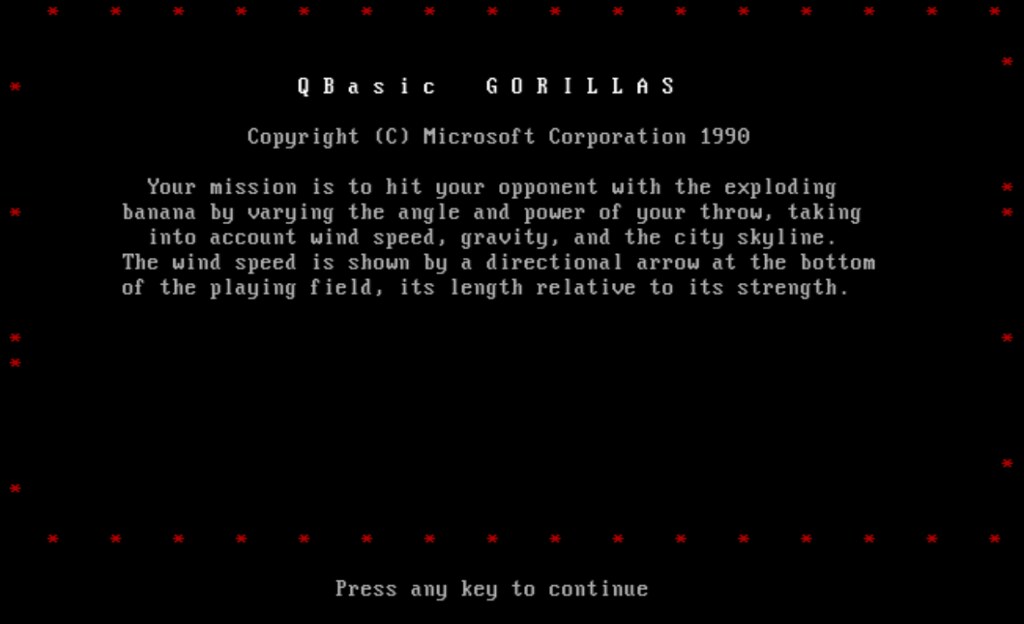In 1991, MS-DOS 5.0 was released to the public. With it, came the programming language QBasic and two pre-written QBasic games: Nibbles and Gorillas. Nibbles was a Snake clone, a TAS of which would kind of look like this. This submission is for the other game, Gorillas. With this, one of Microsoft's very first video games finally has a TAS.
Game objectives
- Emulator used: JPC-rr 11.2
- Goal: Speed
- Genre: Banana-Tossing Strategy
Comments
How the Game Works
The opening screen does such a great job of explaining it, I'll just put it here.

Game Setup
There are four setup options to the game:
1) Player 1's Name
2) Player 2's Name
Because this game was programmed with no A.I., the game must be played by two players. I can enter six characters total between both player names before it costs me a frame, so I put something reasonable for each player.
3) # of points to play to (default 3)
I change this to 1 because, do you really want to watch that gorilla pound its chest two more times?
4) Gravity in m/s (default 9.8)
I use the default here. Although making it higher causes the gorilla to blow up a half-second earlier, it has no impact on when input actually ends. Also, I like the fact that the banana just hangs in the air for a bit before coming down.
Encode
I just have the first gorilla put his exploding banana above his shoulder and let gravity do the rest. Input ends after the velocity (of zero) is entered.
Bonus
I also did a run where the second gorilla loses instead, as well as showing what happens when the sun is hit by a banana. Unfortunately, it costs an extra 18 ms to enter in the angle and velocity values. Still, it's worth a look if you're interested.
Other comments
I'm certain that this is as optimized as it can be. I've been wanting to get in on the April 1st submissions for a few years now, and finally found one that's short enough that I could fit making it into my schedule. My hope is that this will make it to the vault, but even if not, it was quick and fun to do.
Files:
HDD, 16 tracks, 63 sectors, 16 sides.
| Timestamp | MD5 | Size | Filename |
| 19900101000000 | 3651562e0a058e661e38a1e9e82afadb | 29434 | GORILLA.BAS |
| 19900101000000 | f84f0bf74b830603a29f77b11b9e4833 | 194309 | QBASIC.EXE |
| 19900101000000 | 4d0b9e7d5a07d71723e725c2bb07fb82 | 130881 | QBASIC.HLP |
| 19900101000000 | 3d002a12d2a8b76a2cfeab1b5a4fab50 | 132 | QBASIC.INI |
Samsara: this small army of animal-based submissions attacking the site feels a lot like gorilla warfare to me
Samsara: Guess I'm learning JPC-rr!
Samsara: File replaced with a clean input version, shaving off ~13 seconds of dirty input.
I thought about this for a bit, and despite there being a call for Vault publication in the thread, I'll have to reject this run. The lack of A.I. means that there isn't really a "game" to win. The faster TAS really lends itself more to being a "fastest death" run rather than a fastest win, with a controlled suicide leading to player 2's victory. You could argue that the player reaches a win condition, but at the same time I could argue that there's no lose condition in this case, ultimately making "winning" completely trivial. Imagine if there were a fighting game TAS where the first thing the player does is jump backward out of the arena, instantly conceding victory to the opponent. That's (Q)basically what this run is, the only difference here being that player 2 is being "controlled" as well. This also leads to a situation where the run can be easily matched in real time, since the run's strategy is "throw with 0 velocity", which as far as I can tell will lead to this result every single time.
Now, the sentiment in the thread wasn't to Vault that movie, but to Vault the 1 frame slower version where player 1 ends up winning. But from my perspective, that run can't be Vaulted because there's only one end condition for the game: Someone wins. So that means that there is a file out there (this submission) that reaches the exact same end condition in both a faster real time and a faster TAS time.
I do think this was one of the more clever AFD submissions in recent history, but it's still unfortunately not suitable for publication.